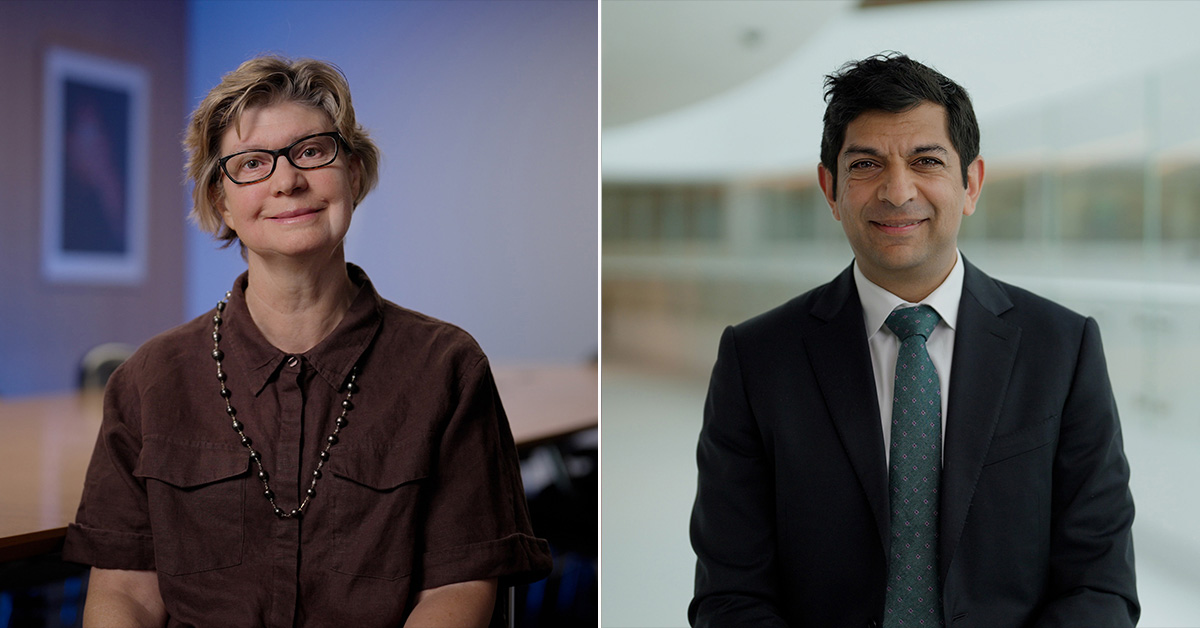Academy honours pioneering breast cancer researchers with prestigious awards
- 5 mins read


Two distinguished researchers have been recognised with 2025 Academy honorific awards for their groundbreaking contributions to breast cancer research.
Find out about all our 2025 honorific awardees.
Professor Jane Visvader FAA FAHMS FRS, Walter and Eliza Hall Institute of Medical Research
Academy Fellow Professor Jane Visvader has been awarded the Ruby Payne-Scott Medal and Lecture, one of the Academy’s most prestigious honours recognising women researchers of the highest standing in biological sciences.
Professor Visvader has made seminal discoveries that define how the breast develops, how developmental errors lead to breast cancer, and potential ways to prevent and treat the disease.
Her landmark 2006 discovery identified breast stem cells responsible for generating all ductal tissue in the breast – the first demonstration that an entire mammary gland could be generated from a single stem cell. This groundbreaking work, published in Nature, propelled the breast cancer and stem cell fields to new heights.
“This was truly a eureka moment,” Professor Visvader said. “It meant that we had this framework to understand the cell that lies at the very apex of everything and how it then gives rise to cells in a regulated fashion to yield the entire ductal system that constitutes breast tissue.”
This groundbreaking work, published in Nature, propelled the breast cancer and stem cell fields to new heights.
Her subsequent work yielded another paradigm-shifting discovery – that luminal progenitors, rather than stem cells, are the likely origin of BRCA1-associated breast cancer. These luminal progenitors were expanded and showed aberrant behaviour in precancerous tissue from BRCA1 mutation carriers. Her finding challenged long-held assumptions and created a new framework for understanding different breast cancer subtypes.
“In the case of BRCA1 and BRCA2 carriers, there are very few options available for prevention, aside from bilateral mastectomy. So it is very important to come in with a targeted therapy that would buy these women time with a hope of totally preventing the formation of breast cancers,” Professor Visvader said.
Professor Visvader’s team also discovered that breast stem cells, while lacking receptors for oestrogen and progesterone, are exquisitely sensitive to these hormones through ‘hormone sensor’ cells.
This discovery has led to an international phase 3 breast cancer prevention study currently underway, potentially revolutionising prevention strategies for women at high risk of developing breast cancer.
On receiving the Ruby Payne Scott Medal, Professor Visvader said she hopes it serves as an inspiration for young, early-career women to strive for the best and not give up.
Associate Professor Shom Goel
Associate Professor Shom Goel is one of two recipients of the Gottschalk Medal, which recognises outstanding research in the biomedical sciences by early-career researchers.
Associate Professor Goel stands at the intersection of scientific research and clinical practice as both an oncologist and scientist. His work focuses on understanding and targeting the cell cycle in breast cancer – specifically on treatments that block cancer cell division.
“In our lab, we specifically study a process known as the cell cycle. And this is a set of steps that all cells must take in order to divide,” Associate Professor Goel said.
“Cancer is a disease where cells are dividing too much. And so it makes a lot of sense to study the cell cycle in cancer.”
His team has made significant discoveries about senescent or ‘sleeping’ cancer cells – cells that stop dividing but remain biologically active.
“Although senescent cancer cells are no longer dividing, they’re still biologically very active,” he said. “We’ve focused a lot of our attention on trying to understand how these cells are different from normal cancer cells.”
These findings have led to new drug combinations for HER2-positive breast cancer that are showing remarkable results.
“What we found was that the use of the drug combination that we discovered helps keep people’s cancers under control for up to 15 months longer than the standard therapies which we’re currently using today.”
Associate Professor Goel returned to Australia in 2019 after a decade in Boston, attracted by both family ties and Australia’s world-class research infrastructure.
“We had realised that the biomedical research infrastructure in Australia, the medical research community, has over the last two decades risen to being one of the very best in the world,” he said.
His personal connection to cancer drives his work. “I lost my father to cancer when I was very young, and so I saw very clearly what kind of an impact this diagnosis can have, obviously on people suffering with cancer, but also on their families, their spouses and their children.”
Biomedical research infrastructure in Australia, the medical research community, has over the last two decades risen to being one of the very best in the world.
Reflecting on the significance of the Gottschalk Medal, Associate Professor Goel said, “It’s wonderful. I’m very honoured to receive the medal. It’s also very energising to me because it tells me that not only do I believe in the work that we’re doing, but that others can see its value as well.”
Bench-to-bedside impact
Both researchers exemplify the vital process of translating laboratory discoveries into clinical treatments, in what Associate Professor Goel describes as “connecting the bench to the bedside”.
“We have many patients in our clinics now who are alive purely because of therapies that were developed over the last one, two or five years," he said. "If we continue to do research in the lab, we’ll be able to continue giving them that hope.”
Professor Visvader and her team have similarly followed this path, with her pre-clinical models providing proof-of-principle for a promising new class of drug called BH3 mimetics that could be used to target aggressive hormone receptor-positive cancers, and which have recently advanced to clinical testing.
These awards recognise not only their scientific achievements but also their commitment to improving patient outcomes through innovative research – research that continues to transform our understanding of breast cancer and offers new hope to patients.





